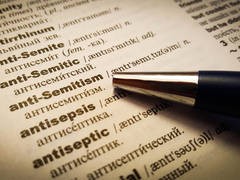
GCED Basic Search Form
Quick Search
You are here
News

Some 50 experts, including representatives of governments and international organizations, met to discuss effective practices and educational approaches to addressing anti-Semitism at an event at UNESCO Headquarters, Paris on 13 July 2017.
The main focus of the event, organized by the OSCE Office for Democratic Institutions and Human Rights (ODIHR) and UNESCO, was the joint development of a guide for educational policy-makers. The guide will offer comprehensive approaches to respond to the challenge of anti-Semitism in classrooms and will draw on guidelines already developed by international and national stakeholders.
‘Education is one of the strongest means of building a society free of anti-Semitism and other forms of discrimination,’ said Jan Henrik Fahlbusch, ODIHR Adviser on Combating Anti-Semitism. ‘Today's discussion has shown the need to provide policy recommendations and good practices to governments on how to achieve this goal most effectively.’
The meeting of representatives from OSCE participating States and UN Member States gave participants the opportunity to provide feedback on the outline of the policy guide. It follows a meeting of an ODIHR education experts group held on 10 and 11 July, also at UNESCO Headquarters.
A human rights issue
The participants explored current discussions on how anti-Semitism is understood and manifests itself. Along with examining effective practices, key policies and sustainable methods for addressing anti-Semitism through education, they also highlighted the educational contexts in which it can be addressed, such as human rights and Global Citizenship Education.
“Anti-Semitism is a human rights issue. It has a negative impact on society as a whole, and not only on the group affected. Preventing anti-Semitism through education should therefore be an effort to equip young people with the skills to reject anti-Semitic views, as well as all forms of prejudice, while understanding better the specifics of anti-Semitism over time,’ said Karel Fracapane, Senior Project Officer at UNESCO Education Sector.
This event was organized as part of the German-funded “Turning Words into Action to Address Anti-Semitism” project of OSCE/ODIHR, which addresses the issue by focusing on three components: security, education and coalition building. The education policy guidelines are scheduled to be ready in 2018.
